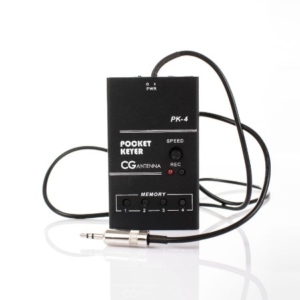I won!
I like watching a British Ham radio program called “The TX Factor” http://www.txfilms.co.uk/txfactor/. They announced a drawing in the September episode for a “pocket Morse keyer”. I decided to enter. On October 2, I received an email from the show’s host telling me that I had won. I was excited. The host called me up a few days ago and recorded an interview. You can hear the interview at http://www.txfilms.co.uk/txfactor/txtalk.shtml. It was all very exciting. Part of the interview will be on the next show. Be sure to look on the first link for the next episode.
My prize is a “CG AntennaPK4 Pocket Memory Keyer “. What’s a pocket keyer? I had to look that up. 
It is a device that hooks to your rig and can send pre-recorded Morse Code messages. I guess that in order to use it, I will have to learn Morse Code, often called CW. Well, I am close to retiring, and I wanted to learn Morse Code anyway. So here is my challenge to all new hams in GARS (and to us not-so-new hams, as well). Let’s learn Morse Code together! Well, you say you are just a Tech licensee. No problem. You do have limited voice privileges on HF, and you also have several bands in which you can send and receive CW. Also, let’s not forget that you can work any band, any mode in VHF, UHF, and above. There are many CW allocations there, as well. Knowing CW will open a new world of amateur radio to you.
The nice thing about CW is it is no longer required for any ham radio license. There is no pressure to learn it. We can learn just for fun! We have several club members who work the CW bands almost exclusively. Most of us know two letters anyway. S is “dit, dit, dit”, and O is “dah dah, dah”. At least we can send “SOS” if we need to! I did get a Novice ham radio license in 1976, and we had to be capable of receiving five words per minute back then. Unfortunately, I was in the military at the time and they sent me to England where my Novice ticket was no good. I had made a goal to myself that when I retired that I would try new modes on the ham bands. Looks like CW will be the first one I try. Want to learn with me?
Perhaps some club members who know CW will rise to the occasion will share some of their CW learning strategies. If so, please pass them along to me. I will share what they tell us works for them.
73
David Harden, KJ4CMY
